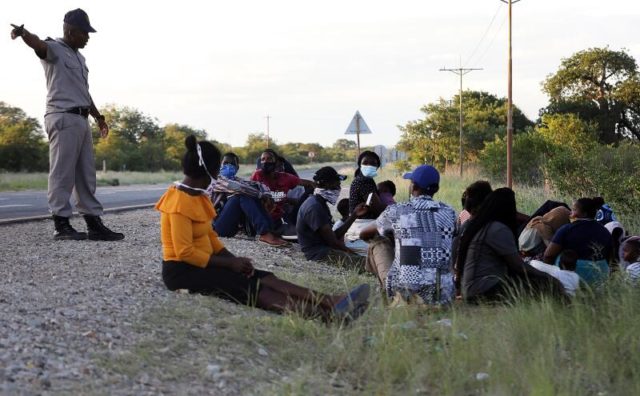Teams tasked to oversee the process at Zimbabwe border say the same people deported come right back the next day, if not hours after being deported.
ARRESTING and deporting people trying to cross the Beitbridge border post illegally is a vicious circle and a waste of government resources, according to Home Affairs officials and the police.
Thousands have been arrested for entering the country illegally, as the festive season drew to a close and Zimbabwean nationals returned from their home country to their jobs in South Africa.
Home Affairs Minister Dr Aaron Motsoaledi last week, while visiting the border, established a management team and deployed guards to curb the influx of illegal immigrants at the border.
But the teams tasked to oversee the process of arresting and deporting people entering the country illegally have become despondent, saying the operations were a waste of money and a vicious circle because the same people deported come right back the next day, if not hours after being deported.
Speaking to a Pretoria News team at one of the roadblocks metres from the border where about 70 people had already been arrested and were getting ready for deportation, an official who asked not to be named for fear of victimisation, said: “We stand in the sun for hours trying to check for proper papers and deport those who don’t have the proper papers.
“But our efforts come to nothing because as soon as we get them to our counterparts on the other side (in Zimbabwe), they just come back and we re-arrest them, if they are unlucky.
“Just this week we have, at the same spot, deported a man for the third time in two days. It’s just discouraging and a waste of money.”
Another police official, who also didn’t want to be named, said some of their colleagues were also disappointing, because they took bribes at the border to let people through without papers.
“They leave us to do the work and catch the illegal immigrants in our operations… And when we ask people how they got through the border, they admit they bribed their way into the country and were not expecting to find another roadblock,” the officer said.
When the Pretoria News team arrived at one of the roadblocks, about 30 people who had been arrested were sitting under a tree awaiting a Home Affairs truck to take them back to their home country. A woman in her late 20s carrying a toddler under a year old was trying to negotiate with the officers to let her through.
Another blind elderly couple with walking sticks were also turned back.
“They always use children as young as a year old to try to blackmail us to let them through… Others act like they are blind and deformed.
“It’s what we have to contend with on a daily basis,” the official said.
Monyabo Mudzuti, 34, a Zimbabwean national admitted to the Pretoria News that he had paid R500 to bribe officials at the border.
“What else can I do? I have to go back to work in Cape Town, and I am scheduled to take a bus from Polokwane to Johannesburg. I don’t have papers because it could take six months for the application to be approved. I would have lost my job by then,” Mudzuti said.
When asked if he would be able to identify the official he bribed at the border, Mudzuti said: “There are too many, and they are faceless. They send young boys from the field, and the boys give them our names and the money, so that when I reach the window I’m let through.”
Home Affairs spokesperson Siya Qoza promised to respond to questions sent to him, but had not yet done so at the time of publication.
Pretoria News








